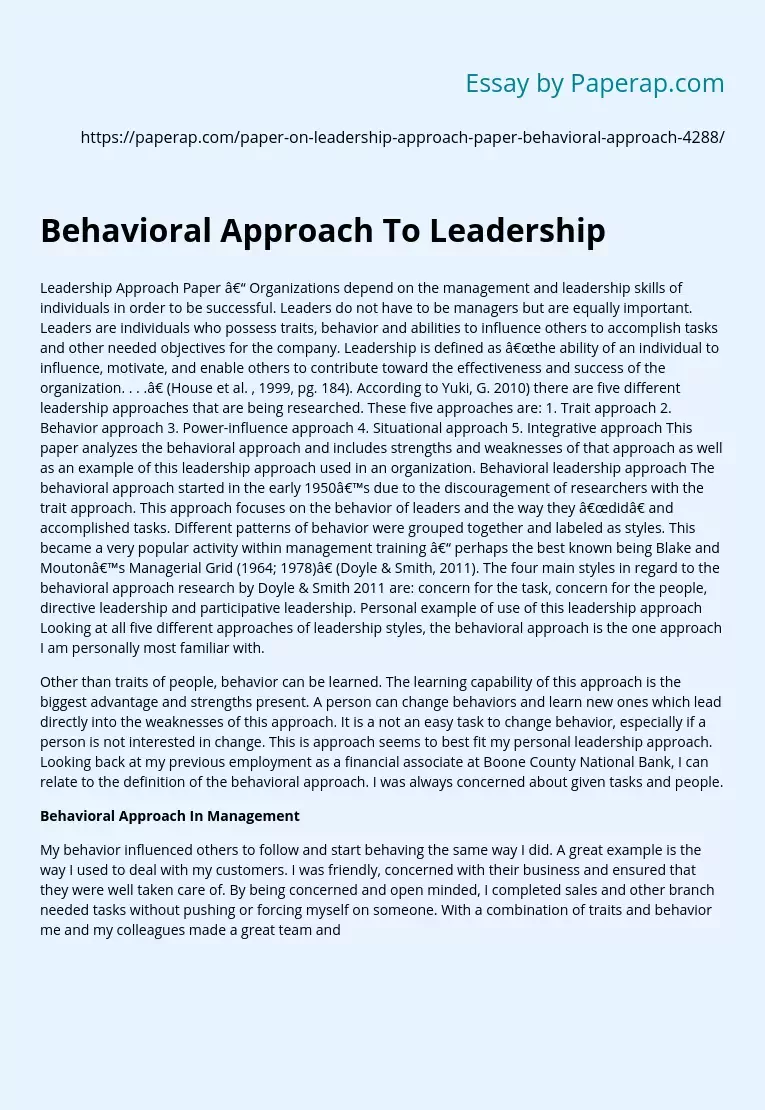Behavioral Approach To Leadership
Leadership Approach Paper – Organizations depend on the management and leadership skills of individuals in order to be successful. Leaders do not have to be managers but are equally important. Leaders are individuals who possess traits, behavior and abilities to influence others to accomplish tasks and other needed objectives for the company. Leadership is defined as “the ability of an individual to influence, motivate, and enable others to contribute toward the effectiveness and success of the organization. . . .” (House et al. , 1999, pg. 184). According to Yuki, G.
2010) there are five different leadership approaches that are being researched. These five approaches are: 1. Trait approach 2. Behavior approach 3. Power-influence approach 4. Situational approach 5. Integrative approach This paper analyzes the behavioral approach and includes strengths and weaknesses of that approach as well as an example of this leadership approach used in an organization. Behavioral leadership approach The behavioral approach started in the early 1950’s due to the discouragement of researchers with the trait approach. This approach focuses on the behavior of leaders and the way they “did” and accomplished tasks.
Different patterns of behavior were grouped together and labeled as styles. This became a very popular activity within management training – perhaps the best known being Blake and Mouton’s Managerial Grid (1964; 1978)” (Doyle & Smith, 2011). The four main styles in regard to the behavioral approach research by Doyle & Smith 2011 are: concern for the task, concern for the people, directive leadership and participative leadership. Personal example of use of this leadership approach Looking at all five different approaches of leadership styles, the behavioral approach is the one approach I am personally most familiar with.
Other than traits of people, behavior can be learned. The learning capability of this approach is the biggest advantage and strengths present. A person can change behaviors and learn new ones which lead directly into the weaknesses of this approach. It is a not an easy task to change behavior, especially if a person is not interested in change. This is approach seems to best fit my personal leadership approach. Looking back at my previous employment as a financial associate at Boone County National Bank, I can relate to the definition of the behavioral approach. I was always concerned about given tasks and people.
Behavioral Approach In Management
My behavior influenced others to follow and start behaving the same way I did. A great example is the way I used to deal with my customers. I was friendly, concerned with their business and ensured that they were well taken care of. By being concerned and open minded, I completed sales and other branch needed tasks without pushing or forcing myself on someone. With a combination of traits and behavior me and my colleagues made a great team and were able to complete all tasks on time, efficiently and effectively as well as satisfy all of our customers and managers.
Looking back over the accomplishments of the branch I worked in as well as my personal accomplishments, I feel proud of what I have helped accomplish. Conclusion Understanding the difference between effective management and effective leadership is important. Leaders are not always born leaders; they can be formed into leaders if that is what they want. All five leadership approaches combined would form the perfect leader but each individual has special traits and behaviors that can make one into a leader.
The behavioral approach is one of the few approaches that can be learned and it is amazing what a difference in behavior can do for someone. Reference Doyle, M. E. , & Smith, M. K. (2011, December 01). Classical Leadership. Retrieved from http://http://www. infed. org/leadership/traditional_leadership. htm House et al (1999), Leadership definition, pg. 184 Retrieved from https://ecampus. phoenix. edu/content/eBookLibrary2/content/eReader. aspx#biblio01_331 Yukin, G. (2010) Leadership in organizations (7th ed. ), chapter 1.
Behavioral Approach To Leadership. (2019, Dec 05). Retrieved from https://paperap.com/paper-on-leadership-approach-paper-behavioral-approach-4288/

